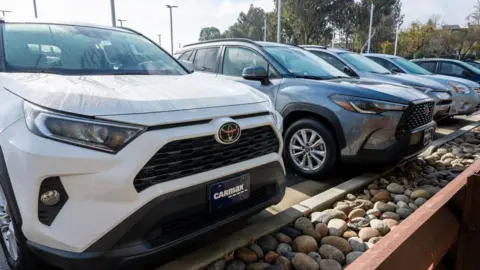Trump announces 25% tariffs on car imports to US

Business reporter, BBC News
 Getty Images
Getty ImagesUS President Donald Trump has announced new trade taxes of 25% on cars being imported to the US.
Trump said the latest tariffs would come into effect on 2 April, with collections starting the next day.
He claimed the measure would lead to “tremendous growth” for the car industry, promising it would spur jobs and investment in the US.
But analysts have said the move is likely to cause major disruption in car production, increase prices, and strain relations with allies.
Mexico is the top foreign supplier of cars to the US, followed by South Korea, Japan, Canada and Germany.
Many US car companies have operations in Mexico and Canada as well, set up under the terms of the longstanding free trade agreement between the three countries. It is unclear the impact the tariffs will have on car parts being sent across borders to manufacturing plants.
Shares in General Motors slid roughly 3% on Wednesday, as the White House said it was planning the announcement. The sell-off spread to other companies, including Ford, after the president’s remarks as he signed the executive order.
Asked at a press conference if there was any chance he would reverse course, Trump said no.
“This is permanent,” he said, adding: “But if you build your car in the United States there is no tariff.”
The fresh import taxes on cars are set to come into force on the same day as so-called “reciprocal tariffs” kick in for individual countries based on their trading relationship with the US.
European Commission president Ursula von der Leyen said the bloc would study the latest announcement, alongside other tariffs Trump has promised to unveil in coming days.
“As I have said before, tariffs are taxes – bad for businesses, worse for consumers equally in the US and the European Union,” she said.
“The EU will continue to seek negotiated solutions, while safeguarding its economic interests.”
The introduction of tariffs on a host of goods being imported to the US is part of Trump’s efforts to protect American businesses and boost manufacturing.
A tariff is a tax on imports collected by a government and it is paid by the company importing the good.
But in protecting domestic businesses, prices for consumers can go up if a company importing goods from abroad passes higher costs on, rather than absorbing them or reducing imports.
In recent weeks, US carmakers, including General Motors and Ford, have called on the US president to exempt imports of cars and vehicle parts from tariffs.
But Trump has proceeded with the move, which is a revival an action he first considered during his first term in the White House.
A study by the Commerce Department at the time warned that American share of global car production was shrinking precipitously, falling from 26% in 1985 to just 12% by 2017, in what it argued was a risk to national security.
Source link



